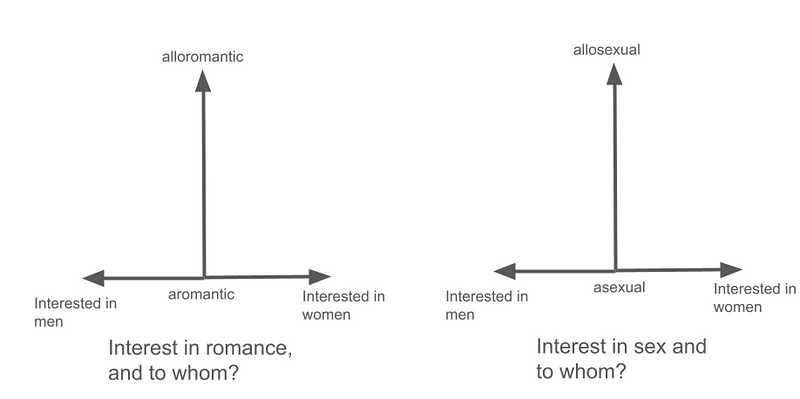Are We Friends or More Than Friends?
Diving into Queerplatonic Relationships

Note: Any qualitative definitions of romance or romantic relationships will be based on my perception of the stereotype in my lived experience as a Chinese-American.
Queerplatonic Relationships (QPRs) are a type of relationship that intersects what society would deem as normal for a romantic partner and a platonic friendship. The term started appearing in the 2010s within the ace and aro(mantic) communities.

What even is Romance?
Before I can dive into what a QPR can be, I need to define what a romantic partnership looks like. Romance looks different to everyone, so I will be describing what I perceive as the stereotype of romance. To me, the stereotype of romance is going on dates, receiving/gifting flowers or other gifts, and sometimes including public displays of affection like kissing or holding hands. The dates would be used as a way to show off wealth, one’s skills, or simply to do something special for the other person. Dates themselves simply serve the purpose of getting to know someone in a 1:1 context.
The key difference between a romantic date and a casual 1:1 hangout is the feeling behind the interaction. A stereotypical romantic partnership involves settling down, cohabitating, having children, and raising a family. A casual 1:1 hangout does not have these questions on anyone’s mind and is typically done because both people enjoy each other’s company and the activity. A romantic relationship will usually include casual hangouts as well as romantic dates to maintain a level of attraction between two people.
In addition, romance can exist outside of sex. Sex need not be romantic, though it can be. Romantic acts typically induce some sort of “melting” feeling or a “fluttering” of the heart. They tend to be quite endearing.
I rarely feel my heart flutter from actions others have done or the way others have treated me. However, only recently, have I learned to receive and appreciate acts of chivalry or other “gentlemanly” type behavior without feeling weak (as a woman who wants to feel capable and strong). I also need to get to know someone decently well before any romantic feelings arise as I mentioned in my previous blog.
In addition to romantic actions, there are also standards for a certain level of emotional support and confirming the relationship socially. For example, someone might go to their romantic partner as their primary source of emotional support and spend the majority of their time with their partner, while making their exclusive relationship evident during social events with others.
So what is a QPR like?
A QPR on the surface has much of the same attributes as a typical romantic relationship — however, it’s not stereotypically romantic. Both people could cohabitate and commit to the relationship long-term; however, one could say that the interactions between the members feel more like best friends than the stereotype of “lovers”.
Best friends may be affectionate with each other like cuddling and holding hands. Maybe even some kisses (given that kisses aren’t solely romantic in some cultures). Lovers typically are affectionate and their relationship will often include sex. There are enough definitions online of how a sexless relationship is a loveless relationship or that the definition of a romantic relationship must include sex. A QPR tries to circumvent this black-and-white thinking by including a mix of different types of affection and physical intimacy depending on the boundaries and comfort between the 2 people involved.
People who desire a QPR typically describe themselves as wanting the company of their friend, but not to the same extent as going all the way to what an allosexual or alloromantic would want. They might not enjoy grand acts of romance or sex and still feel just as strongly for their partner.
In a society where romantic relationships are considered superior to platonic friendships, QPRs attempt to meet in the middle ground and blur the lines of what’s considered valid for a long-term commitment.
Is this not Friends with Benefits?
“Friends with Benefits” relationships involve friends who have sex. The act of desiring sex means that this person is allosexual or open to sex. FWB relationships are often a conscious choice by romantic people who are also sexual. The FWB is colloquially defined by the benefit of sex. When it is an unconscious pattern by folks who prefer FWB relationships, it can be a subtype of Queerplatonic Relationship. These people will desire a partner to satisfy their sex drive, but will not feel any intense romantic feelings towards their sexual partners.
You’re just scared of commitment
As has been stated, plenty of people on the aromantic spectrum don’t have a desire or drive to want to live with a partner or to spend the majority of their time around a specific person. They haven’t felt intense feelings with anyone to want a deeply committed relationship.
In certain situations, some QPRs do decide to get married. To them, it could be for financial reasons or as a way to declare a commitment to their long-term friendship or cohabitation status.
So do these people just not want kids?
People in QPRs can want and have kids. Having kids is a conscious decision that the pair makes. The definition of the QPR is not about whether there are kids in the picture or not, it is about the intensity of the feelings that are felt and the quality of those feelings. Oftentimes, romantic relationships are invalidated because someone may feel subdued feelings that aren’t as intense as the person they’re dating. A QPR makes it so that these subdued feelings are just as valid. One can care about another person and want to have kids in life and think of their partner as a good parent, while not having those intense feelings, sexual or otherwise, towards that person.
Is Dating a priority for these people?
Dating with the intent of finding a long-term partner may not a priority to those on the aromantic spectrum. Some people are repulsed by romance, others simply don’t crave it. Some people feel fulfilled by life without feeling the need to settle down and start a family. Having a constant companion in life turns into a “nice-to-have” or a “don’t need” rather than a “must-have”. Some alloromantics are temporarily deprioritizing dating, but for aromantics, dating for romance isn’t something that’s desired.
Some people do want to find a cohabitation partner or a long-term sexual partner, and therefore, do actively try to meet people and go on dates. However, the acts or feelings that these people feel, may not be romantic or sexual — thereby, not fulfilling a stereotypical romantic relationship.
Personally, I would like to find a long-term partner with whom to cohabitate in a QPR. I’m not the biggest fan of grand gestures of romance, though, I do feel intense feelings for certain people.
At the end of the day, “relationship” is a vague word that doesn’t mean anything until the “relationship” is defined by its quality. A QPR gives more nuance to what this “relationship” can be and allows for people to feel valid in how they feel with others either in long-term sexual relationships or long-term non-sexual relationships. It breaks down the barriers to allow for more affection with others for those who are simply seeking affection and closeness without anything more.